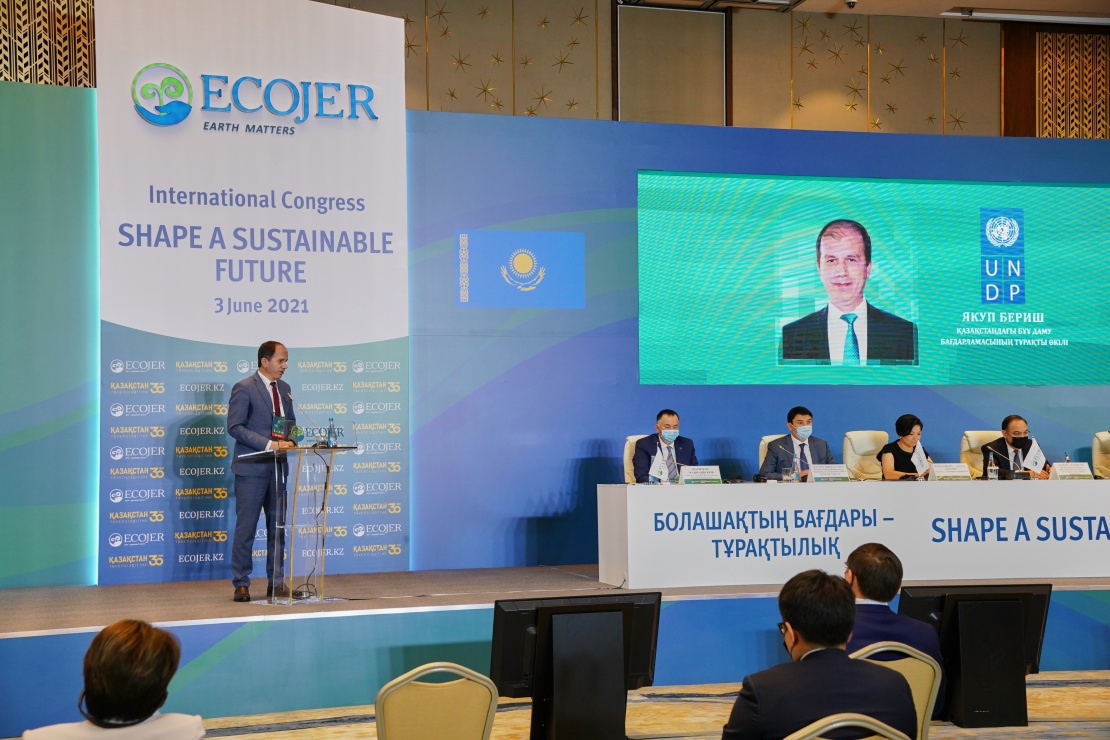
On the 3rd of June 2021, the first International Congress "ECOJER" - "Shape a sustainable future" took place in Nur-Sultan. The agenda covers a wide range of issues, including Kazakhstan's international cooperation in the fight against climate change. Several high-ranking officials spoke on this issue.
Jakub Berish, UN Programme's Permanent Representative of Kazakhstan, declared in his speech: “Kazakhstan creates a stable platform for a better future, thus moving towards the most developed countries of the world. However, environmental indicators of Kazakhstan, such as fossil fuel consumption, emissions, soil erosion, create additional complications during the pandemic. Considering all the above, Kazakhstan may lose its ability to follow certain goals and objectives of sustainable development."
Suma Chakrabarti, Adviser to the President of Kazakhstan on Economic Development, Effective Governance, and International Growth, focused on Kazakhstan's ambitious target aimed to be completed by 2060. Last December, President of Kazakhstan Kassym-Jomart Tokayev spoke at the Summit on climate ambitions and the strategic goal of achieving a carbon-free future for Kazakhstan by 2060. Mr. Chakrabarti highlighted some of the challenges to attain the goal:
“Kazakhstan is one of the most energy-intensive countries in the world. Energy-intensive and extractive industries account for 60% of industrial production in Kazakhstan. Thus, the export competitiveness in Kazakhstan will be affected significantly if the problem is not resolved."
Nariman Mannapbekov, director of the representative office of the Asian Development Bank in Kazakhstan, spoke about the need to resolve the issue with the coal industry and coal energy. He noted that the importers of Kazakh coal would rapidly reduce its consumption, domestic consumption would also gradually decline; he also highlighted the importance of scientific research. The Bekturov Institute of Chemical Sciences, the expert noted, is utilizing at least some of the coal mined in the country; scientists already have the best practices for improving soil fertility. But - “the issue of financing this applied research does not lose its relevance”: Kazakhstan's expenditures on R&D are only 0.12%. At the same time, many other upper-middle-income countries spend at least 2-3% of GDP for these purposes.
Meanwhile, Kazakhstan is quite successfully developing approaches to adaptation to climate change. On the 1st of July, a new Environmental Code comes into force, which includes provisions on climate adaptation in such areas of public administration as agriculture, water and water management, and civil protection. Minister of Ecology, Geology and Natural Resources of Kazakhstan Magzum Mirzagaliyev stated the following on this issue:
“It will create an effective system for increasing resilience at the local level. The implementation of the project will begin from an initial assessment in the most vulnerable sectors: water, agriculture, forestry, and civil protection. As a result, it will be possible to take into account climate risks and develop the necessary measures to adapt to climate change at the national and local levels in sectoral government programs."
The result of the Congress was a resolution, which included proposals and recommendations of the participants for Kazakhstan to achieve its obligations under the Paris Agreement.
Climate Adaptation and Mitigation Program for the Aral Sea Basin (CAMP4ASB).